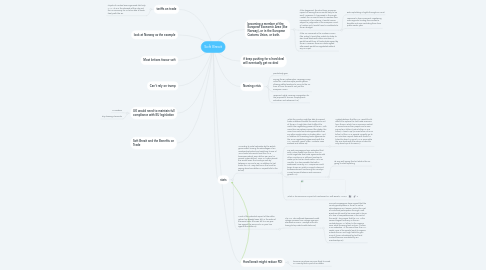
1. tariffs on trade
1.1. Lloyd’s of London boss Inga Beale told City A.M.: “It is in the interests of the City and the UK economy for us to be able to trade freely with the EU.
2. look at Norway as the example
3. Most britons favour soft
4. Can't rely on trump
5. UK would need to maintain full compliance with EU legislation
5.1. E numbers
5.2. dry cleaning chemicals
6. Soft Brexit and the Benefits on Trade
7. becoming a member of the European Economic Area (like Norway), or in the European Customs Union, or both.
7.1. If this happened, the short term economic impact of leaving the EU would likely to be small. However, if it remained in the Single Market, the UK would have to maintain free movement of EU citizens, it would remain subject to judgments of the European Court of Justice and it would have to contribute to the EU budget.
7.1.1. Extra upholding of rights through EU Court
7.1.2. responce to free movement: registering new migrants, limiting their access to benefits and even excluding them from public-sector jobs.
7.2. If the UK remained in the Customs Union (like Turkey) it would be unable to strike its own trade deals with other countries. It would benefit from all trade deals signed by the EU. However those EU deals signed after Brexit would be negotiated without any UK input.
8. if keep pushing for a hard deal will eventually get no deal
9. Hard brexit might reduce FDI
9.1. because countries are more likely to invest in a county that is part of 50 others
10. Nursing crisis
10.1. productivity gain
10.2. During the EU referendum campaign many called for Australian-style points system, allowing skilled workers to come to the UK from all over the world, not just the European Union.
10.3. reciprocal rights covering immigration for the purpose of tourism, employment, education and retirement.12)
11. stats
11.1. According to initial estimates by the British government, leaving the advantages of EU membership behind and switching to use of WTO trade rules would cost the U.K.’s businesses about £65.5 billion per year (or around US$82 billion). Over a 15-year period, this would lower the country’s GDP by between 5.4% and 9.5%. In addition to lost trade, the U.K. may also be on the hook for paying about £20 billion in unpaid bills to the EU.20)
11.1.1. While the country might be able to expand trade unfettered around the world once out of the EU, it might also find it difficult to match the negotiating power of the EU. With more than 50 partners around the globe, the union has more free trade agreements than any other single nation or trading bloc. And in addition to its existing trade agreements, the EU is negotiating agreements with the U.S., Canada, Japan, India, Australia, New Zealand and others.22)
11.1.1.1. Analysts believe that the U.K. would find it difficult to replace the lost trade revenues from the EU, which has a consumer market of around 500 million people and a GDP around €12 trillion (US$13 trillion or £10 trillion). About 44% (or £220 billion of £510 billion) of the U.K.’s exports currently go to EU countries. Export trade with the EU is linked to about 12.5% of U.K.’s GDP, while the EU’s trade with the nation is linked to only about 3% of its GDP.21)
11.1.2. Pro-exit campaigners have estimated that with a clean break from the EU, the U.K. could negotiate free trade agreements with other countries in a sufficient number to make up for lost EU trade within 12 to 24 months. It is also possible that with a weakened currency U.K. companies could begin to see an uptick in export sales and business abroad, reinforcing the country’s current account balance and economic growth. 27)
11.1.2.1. its very well saying this but what is the UK going to start exporting
11.1.3. What Is The Economic Impact Of Hard Brexit vs. Soft Brexit? - FXCM
11.2. Much of the potential impact of the softer option has already been felt. In the wake of the Brexit vote, the GBP fell to a six-year low against the euro and a 31-year low against the dollar.24)
11.2.1. The U.K. also suffered downward credit ratings revisions from ratings agencies Standard & Poor’s, Moody’s and Fitch, losing its top-rated credit status.25)
11.2.1.1. Pro-exit campaigners have argued that the country participation in the EU is not as advantageous as it seems, and so the cost of continued participation through a soft Brexit would need to be measured in terms of a loss of competitiveness in the rest of the world. They argue that the U.K. is the second-largest economy in the EU, contributing €14.1 billion to the region’s GDP, while receiving back only €7.1 billion in EU subsidies. At the same time, the U.K. sends more of its exports (56%) to regions outside the EU and might stand to gain more if it was unhindered by tariff and nontariff barriers mandated by EU membership.26)

